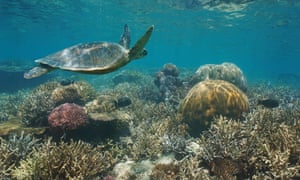This is the moment for the equivalent, in conservation terms, of the #MeToo or Black Lives Matter movements
We
are living in a time of environmental anger and despair, and not
without cause. Exponential growth of human consumption has led to
catastrophic losses of habitats and the decimation and extinction of
species. Covid-19, itself a symptom of a world out of ecological
balance, has brought not only human tragedy, but also the loss of 2020
as a biodiversity and climate “super year” for planetary assessments and
action. The fleeting good environmental news from the shutdown, of
wildlife emerging from hiding places and an early precipitous drop in
greenhouse gas emissions, has been replaced by a flood of single-use
plastics, an outbreak of poaching and deforestation, and attacks on
environmental regulations.
It is no wonder, then, that grief is so prevalent among people such as ourselves, who work to protect wildlife and habitats. In one popular, albeit simplified, representation of the stages of grieving, initial denial is replaced by anger, bargaining, depression, and ultimately acceptance. Most environmentalists are well past the denial stage, but expressions of anger and depression abound, which nurtures a culture of negativity. This is often expressed as scepticism, criticism or rejection of research reporting positive outcomes for the environment whenever recovery is partial, pressures remain, or data is incomplete (which is almost always the case). In other words, as Voltaire argued against 250 years ago, we make the perfect the enemy of the good.
In its extreme form, negativity among environmentalists represents a denial that positive outcomes are possible. This stance renders the narrative of a broken biosphere into self-fulfilling prophecy, as ecologist Roger Bradbury exemplified in the New York Times in 2012: “It’s past time to tell the truth about the state of the world’s coral reefs … there is no hope of saving the[m].” Acceptance of a person’s death can be the final stage of grief, but acceptance should not be the last stage for environmental losses that can and must be avoided, and that can often be reversed.
"Recovery must be green (and blue, for a healthy ocean) and it must be just, benefiting all"
In the ocean, for example, I, along with colleagues, recently demonstrated
that many ecosystems and species could be rebuilt by 2050 if people
worked together to repair the damage and stabilise the climate. Our
identification of a growing number of successes
in marine conservation, often rooted in policies and actions adopted
decades ago, received a rapid backlash from some colleagues who
criticised our evidence-based positivity as complacent optimism.It is no wonder, then, that grief is so prevalent among people such as ourselves, who work to protect wildlife and habitats. In one popular, albeit simplified, representation of the stages of grieving, initial denial is replaced by anger, bargaining, depression, and ultimately acceptance. Most environmentalists are well past the denial stage, but expressions of anger and depression abound, which nurtures a culture of negativity. This is often expressed as scepticism, criticism or rejection of research reporting positive outcomes for the environment whenever recovery is partial, pressures remain, or data is incomplete (which is almost always the case). In other words, as Voltaire argued against 250 years ago, we make the perfect the enemy of the good.
In its extreme form, negativity among environmentalists represents a denial that positive outcomes are possible. This stance renders the narrative of a broken biosphere into self-fulfilling prophecy, as ecologist Roger Bradbury exemplified in the New York Times in 2012: “It’s past time to tell the truth about the state of the world’s coral reefs … there is no hope of saving the[m].” Acceptance of a person’s death can be the final stage of grief, but acceptance should not be the last stage for environmental losses that can and must be avoided, and that can often be reversed.
"Recovery must be green (and blue, for a healthy ocean) and it must be just, benefiting all"
Today, the focus of many conservationists on returning ecosystems to some past, idealised state fails to consider that ecosystems are constantly changing and must adapt as conditions shift, both from human pressures as well as natural events. Understanding of past states is crucial to keep ambition high, but conservation must be forward-looking and pragmatic. Indeed, our assessment that marine life can be largely rebuilt by 2050 was put forward as a “great challenge”, one that will require major efforts and a tenacious commitment to expand effective protection of ocean space and species, remove pollution, harvest wisely and tackle the climate crisis.
The world grieves for lost lives and the economic devastation caused by the pandemic. Yet, when the world returns to consider this year’s reboot of global environmental goals, the operating assumptions that confined previous conservation efforts must change. Recovery must be green (and blue, for a healthy ocean) and it must be just, benefiting all. We should not simply dust off plans to address environmental problems from 2020; this crisis is a springboard for bolder solutions to rebuild biodiversity and ecosystems and reverse the effects of the climate emergency.
There are already promising signs: a quarter of the EU stimulus package in response to the coronavirus crisis, totalling $826bn (£655bn), will be set aside for climate-friendly measures, such as clean energy technologies and transportation and sustainable land use. Biodiversity conservation and restoration must also be targeted to restore the ecological filters and barriers that shelter humans from future disease transmission from wildlife.
As the singer Joan Baez said: “Action is the antidote to despair.”
- Carlos M Duarte is Tarek Ahmed Juffali research chair of Red Sea ecology at the King Abdullah University of Science and Technology. This was written with Callum Roberts, professor of marine conservation at the University of Exeter, and Nancy Knowlton, a marine scientist and author of Citizens of the Sea

No comments:
Post a Comment